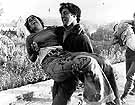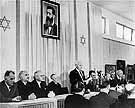
|
|
|

|

|

|

|
|
Click on an image to see a larger, more detailed picture.
|
|
|
|
|
| EPILOGUE: The Aftermath |

|
pg. 665 |

|
|
|
|
| |
 The village of Ma'alot in Galilee became a target of Palestinian terrorists in May 1974. Twenty schoolchildren were killed. Here, Galil Maimon carries his injured sister, Zipora, to safety.
The village of Ma'alot in Galilee became a target of Palestinian terrorists in May 1974. Twenty schoolchildren were killed. Here, Galil Maimon carries his injured sister, Zipora, to safety.
Photo: UPI / Corbis-Bettmann
|
|
National power does make one's opponents think twice before tampering with it, and anyone who tampers with Israel's security, or with Jewish well-being anywhere in the world, should not expect to do so with impunity. These political considerations are among some of the Holocaust's most important repercussions. Issues of Guilt Few events have affected Jewish and Israeli identity more than the Holocaust. Holocaust repercussions affect German identity in related ways. No April sirens' scream brings Germany to a silent halt in observance of the destruction of European Jewry, but that nation's history is inescapably tied to Holocaust history. As a new century begins, Berlin will be the site of a new memorial, one whose birth pangs have been painfully difficult. It will be Germany's Memorial to the Murdered Jews of Europe. For some time there have been Holocaust memorial sites on German soil; the former concentration camps at Buchenwald, Dachau, Ravensbrück, and Sachsenhausen are a few examples. But the Berlin memorial, which will be located in the heart of the nation's capital, represents a special national acknowledgment of Germany's historic responsibility for the Holocaust. In June 1998 a five-member Findungskommission recommended a design submitted by American architect Peter Eisenman, which features what has been called an expansive field of waving pillars. The design, widely praised in the German press, had been accepted by Helmut Kohl, who was chancellor at the time. However, resistance led by Kohl's political opposition put final decisions on hold until after Germany's September 1998 elections. Those elections made Gerhard Schröder the new chancellor. Michael Naumann, Schroeder's culture minister, opposed the idea of a national Holocaust memorial, but negotiations between Naumann, Eisenman, and the Findungskommision led to workable modifications.
|
 Establishment of Israel
Establishment of Israel
Zionists' long, cherished goal of creating a Jewish homeland in Palestine was finally achieved on May 14, 1948, when David Ben-Gurion (standing, below) proclaimed the existence of the state of Israel. Jewish loss of life during the Holocaust directly contributed to the overwhelming support of the international community for the creation of a sovereign Jewish nation. On November 29, 1947, the United Nations voted to partition Palestine into two states, one Jewish and the other Arab. While Arab nationalists completely rejected the plan, leaders of the Jewish community in Palestine ultimately accepted the partition. When Prime Minister Ben-Gurion announced the creation of the state of Israel within the boundaries allotted to it by the partition plan, armies from Arab states almost immediately invaded the newly created nation.
Photo: Central Zionist Archives / United States Holocaust Memorial Museum Photo Archive
|
|

|

|

|

|
 1950: Israel passes the "Law of Judging Nazi Criminals and Their Helpers," opening the way for trials in Israel of former Nazis.
1950: Israel passes the "Law of Judging Nazi Criminals and Their Helpers," opening the way for trials in Israel of former Nazis.
|
 1950: SS functionary Adolf Eichmann escapes to Argentina with help of "Odessa" operatives, former SS officers whose goal is to aid such escapes.
1950: SS functionary Adolf Eichmann escapes to Argentina with help of "Odessa" operatives, former SS officers whose goal is to aid such escapes.
|
 June 1950: The American Displaced Persons Act of 1948 is modified by Congress to allow equitable Jewish immigration to the U.S. The original act had favored Jews whose homelands were under Soviet rule after the war.
June 1950: The American Displaced Persons Act of 1948 is modified by Congress to allow equitable Jewish immigration to the U.S. The original act had favored Jews whose homelands were under Soviet rule after the war.
|
 December 1, 1950: The second of three secretly buried parts of the Oneg Shabbat archive, organized by Emanuel Ringelblum and including his personal diary, is discovered in Warsaw beneath what had been 68 Nowolipki Street. Contents include eyewitness testimony of the Treblinka death camp, given by Abraham Jacob Krzepicki, a young escapee.
December 1, 1950: The second of three secretly buried parts of the Oneg Shabbat archive, organized by Emanuel Ringelblum and including his personal diary, is discovered in Warsaw beneath what had been 68 Nowolipki Street. Contents include eyewitness testimony of the Treblinka death camp, given by Abraham Jacob Krzepicki, a young escapee.
|
|
|
|
|
| EPILOGUE: The Aftermath |

|
pg. 665 |

|
|
The Holocaust Chronicle
© 2009 Publications International, Ltd.
|
|
